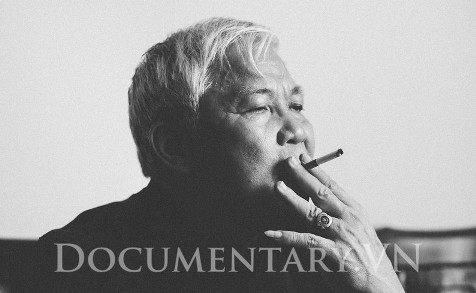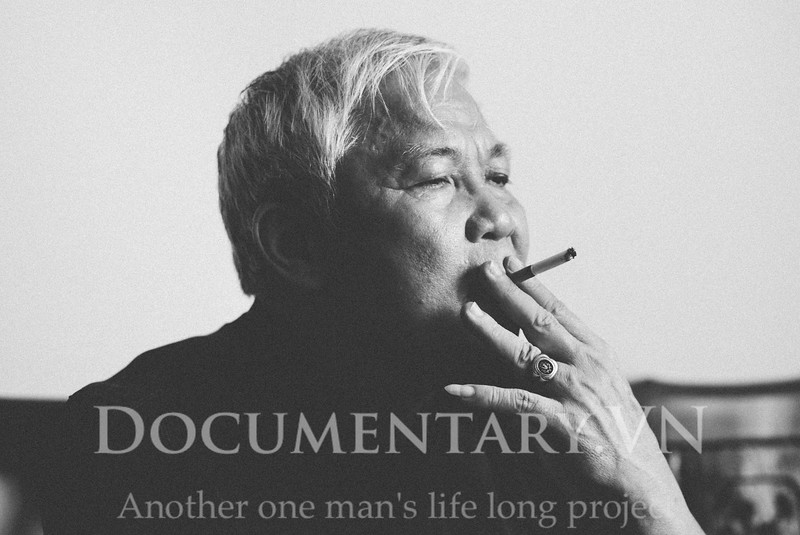
1. There are repetitions that, upon reflection, are so similar, even to the point of being identical, that one cannot consider them mere coincidences. I am referring to the choices made by Tran Dinh Huou and Tran Ngoc Vuong when they went to the Soviet Union, a crucial turning point in their lives. Both made choices that are not easily understood by outsiders or even by those familiar with the subject. In the mid-1950s, it was difficult for anyone to imagine that Tran Dinh Huou, a communist party member, upon arriving in the Soviet Union, would choose to study a philosopher and thinker from pre-Qin China—a thinker who, at first glance, had little connection to Vietnam and Vietnam at a time when the resistance war against France had just ended and the country was beginning its socialist construction.
Tran Ngoc Vuong was no different. His time studying in the Soviet Union (1988-1993) coincided with Perestroika and the subsequent collapse of the Soviet Union. The winds shifted, and doors opened. Western rock bands set foot and performed in places that, just a few years earlier, they could only reach by sports plane, landing, receiving lengthy prison sentences, and then being released as prisoners of war or spies. The divisions and antagonisms of the Cold War had temporarily subsided. Russia had become more open and tolerant of itself and the world. Many legacies of the past were re-evaluated. Many researchers once considered "heretics" were rehabilitated and even celebrated. Western ideas and research theories were accepted, not as enemies, but with a much friendlier attitude than before. Studies of formalism, psychoanalysis, or even structuralism and post-structuralism, at least, have been introduced in a very complete and systematic way. It's worth reiterating, ironically but very true, that, at least to this day, the most decent dictionary of modern Western philosophy we have is the one published by the Social Sciences Publishing House in 1996, a translation of a dictionary compiled in Moscow in 1991. This illustrates the tremendous changes in the times and scholarship in Russia at the end of the reform period and during the years following the collapse of the Soviet Union.
In such a context, with the responsibility of academic innovation in the country, a graduate student would certainly be easily drawn to novel theories, to formalist or psychoanalytic studies, and structuralist research. In the academic context of Vietnam in the 1980s, these theories were not without significant influence in adjusting the perspective on literature, correcting the approach to literary reality which had long been dominated by a sociological viewpoint that was often vulgar, neglecting or degrading the aesthetic and creative essence of literature. However, Tran Ngoc Vuong made a different choice. He pursued authorial typology, an approach that at that time had become somewhat classical, even in the sense that it was no longer fashionable. It should also be added that this was also the time when, in the West, the debate about the death of the author was raging and had spread its heat to cold Russia. And in making that choice, Tran Ngoc Vuong overlooked another option: abandoning academia to bring materialism from the theoretical realm into the practical realm.

Professor, Doctor, Distinguished Teacher Tran Ngoc Vuong
The remarkable thing is that this seemingly conservative choice resulted in a work with many discoveries, a treatise that has been classified as a classic by the academic community: The Typology of Literary Authors - the Scholar-Intellectual and Vietnamese Literature. Developing from the profound ideas of researcher Tran Dinh Huou, this treatise for the first time presents, in the most complete, systematic, and in-depth way, the appearance of a type of author who played a particularly significant role in shaping the artistic literary landscape of Vietnam. It is a brilliant insight, as through one type of author, one can envision other types of literary-intellectual authors who played important roles in constructing Vietnamese history and culture. And in this respect, Tran Ngoc Vuong's contribution is not insignificant. It can be said that, after Tran Trong Kim and Tran Dinh Huou's writings on Confucianism, readers can gain a different perspective on Confucianism, presented through human portraits and different from the view that has dominated academic circles for decades, associated with often simplified paradigms of feudalism and patriotism. By choosing Confucian studies as the basis for his dissertation in the Soviet Union, Tran Ngoc Vuong absorbed the most refined, humane, and humanistic aspects of Russian and Soviet academic scholarship: classical Russian philology and Oriental studies. This is the crucial foundation for building basic science in the field of philology, the blank slate that Confucius himself, the sage of Confucianism, once spoke of to his students. Beneath that choice lay a powerful yearning, paid for with the sufferings of life—sufferings that were not academic at all—for a fundamental science of lasting value, something immortal that would guarantee the future, as Hoai Thanh put it.
2. Read the works of Tran Ngoc Vuong, fromLiterary author type… viaVietnamese Literature: A Distinct Stream Within a Common SourcearriveVietnamese entities viewed from letter coordinatesOne concept frequently repeated by him is the paradigm. If language is a reflection of thought, then paradigm is the concept that most faithfully reflects Tran Ngoc Vuong's line of thinking. As a philologist, but above all, a researcher of the humanities, Tran Ngoc Vuong's perspective is always holistic. This approach is evident from his first treatise on the typology of literary authors. Taking the author, the creative subject, as the center of his study, in his work, the creative individual is always placed within intricate relationships with biography, including hidden and profound aspects that only those "immersed" (as he often says) in the source material can see; with the era, within the complexity and multidimensionality of history (rather than just an extremely simplified and politicized history); and above all, with the historical and philosophical foundations upon which the act of writing is constructed. Literature is viewed throughout its entire history, with all its continuity and discontinuity. Therefore, even without being a specialist in modern literature, careful reading is still necessary.Type...in Tran Ngoc Vuong's work, we can still perceive the resurgence of Confucian scholarly literature in many subsequent periods, even when this type of author no longer exists. And it is absolutely not a play on words when his second book is titled...Vietnamese Literature - A Distinct Stream Within a Common SourceThe unique stream of national literature is deciphered, analyzed, read, interpreted, and explained by placing it within the common context of the history and intellectual history of Vietnam, East Asia, and the world. And inevitably, his third monumental work transcends the realm of literature. It is an ambition to discover the essential elements, the constant characteristics, and the most fundamental laws of the Vietnamese entity throughout history, viewed from words that are not merely literary. For this reason, Tran Ngoc Vuong's works are not only a narrow reference source within the field of philology but also offer crucial insights for related disciplines such as history, intellectual history, and political history.

Photo: Jackie Chan
To quote the author, Tran Ngoc Vuong's works reveal a unique type of scholar: someone who blends the qualities of both an expert and a polymath. Each of his articles and works is a thorough exploration, a "deep dive" (to use the author's own words) into a problem from a particular approach. However, this thorough exploration is highly productive and thought-provoking. This is because each of his problems is placed within complex links to other fields of knowledge. To achieve this, the researcher needs to construct their knowledge across many disciplines. It can be said that Tran Ngoc Vuong belongs to the type of polymath researcher that, in today's era where the professionalism and depth of research disciplines are increasingly complex, is becoming increasingly rare in academic life. He was a continuation of a tradition of figures like Dao Duy Anh, Truong Tuu, Dang Thai Mai, Tran Dinh Huou, Ha Van Tan, and others—a tradition without which it would be difficult to have what is truly called fundamental science.
3. It is no coincidence that throughout his life of literary research to this day, Tran Ngoc Vuong has chosen not the text or genre, but the author. Reading his treatises on Nguyen Trai, Nguyen Khuyen, Phan Boi Chau, and especially Tan Da, one can see that he never denies the complexity of human existence, nor does he turn his back on the hidden depths of biography. However, he firmly rejects reducing these hidden areas to biological impulses or individual desires in the manner of classical psychoanalysis. In this respect, Tran Ngoc Vuong is not unfamiliar with psychoanalysts after K. Jung. For him, human beings, even artists, are first and foremost social creatures. Literature, for him, is not a game of words, a pure release of creative impulses, but first and foremost, a fulfillment of social responsibility. Perhaps this is also the root cause of Confucianism, the most worldly doctrine among East Asian philosophical theories, becoming an obsession throughout his life of research. And not only that, he also brought this very concept into his research and academic work. Understanding this, it becomes clear that, inevitably, all of his most recent works are direct reflections on the fate of the nation, on the problems of contemporary society, on the sovereignty and existence of the Vietnamese people and nation in the modern world. For Tran Ngoc Vuong, literature or research cannot be a game of intellect, however noble, but must be an act of accepting responsibility to society, a critical voice of the intellectual. For him, literature is a gateway to understanding people and the nation; writing literature is also a way of accepting responsibility, an act where the danger of misunderstanding is always imminent. This was a continuation of a tradition of intellectual responsibility, a tradition perfectly embodied in his teacher, Professor Tran Dinh Huou.
Looking back at Tran Ngoc Vuong's essays, it's clear that his most heartfelt, profound, and beautiful writings are those about Nguyen Trai and Phan Boi Chau. These are not merely cold, objective, empirical discoveries, but rather the realization of an aspiration, an boundless yearning for the sublime. This is also why he almost never wrote about contemporary literature, an era lacking heroism. In the hustle and bustle of today's life, these works serve as a constant reminder of something indispensable, something "more necessary than a hundred thousand other things" (to use Hoai Thanh's words), something without which life would lack meaning: a belief in the truth and meaning of life itself.
|
PROFESSOR, DOCTOR, OUTSTANDING TEACHER TRAN NGOC VUONG
Faculty of Literature, Hanoi University. Faculty of Literature, University of Social Sciences and Humanities.
Head of the Department of Medieval Vietnamese Literature (1995 to present).
|
Author:Dr. Pham Xuan Thach